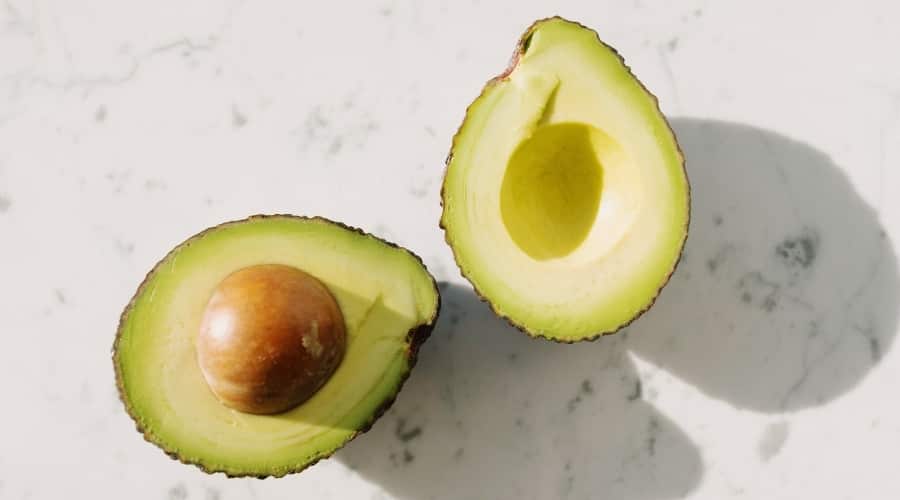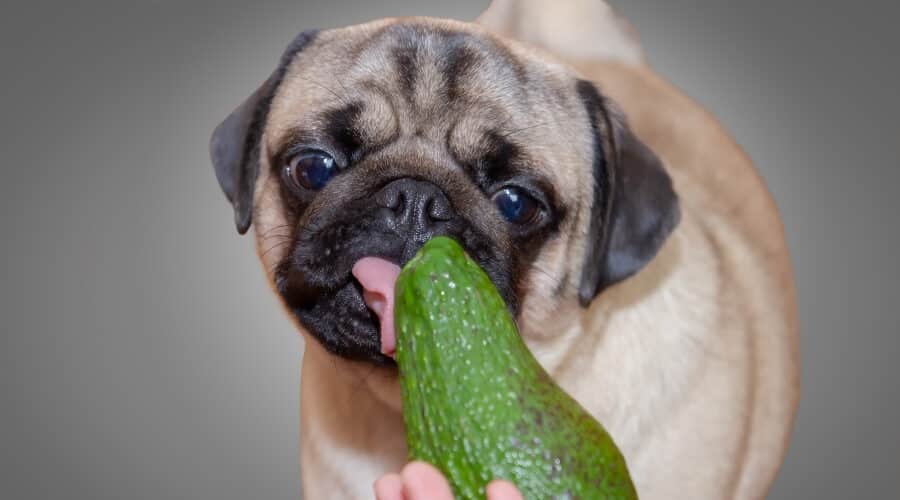In this modern age, we are taking our health and nutrition more seriously. This has had an impact on our pets’ lives too. Humans often enjoy the glorious Avocado, which is a popular green superfood. So it’s no surprise, that you may be asking yourself if it’s safe for your dog to eat Avocados, too.
Pet parents have never been more committed to understanding the options available when feeding their companion. This helps all pet owners choose the best possible nutrition options for their furry friends. So, it’s not at all surprising that dog diets, both shop-bought and homemade, are becoming more varied.
There are many recognized superfoods in our human food market, so-called because they are so tightly packed full of nutrients. Avocado is one of the trendiest healthy foods of the moment and is becoming a regular staple in our diets. But can dogs also eat avocados? And would they see the same health benefits?
Are Avocados Safe For Dogs?

Unfortunately, that’s not an easy question to answer. Avocados contain persin, a toxic compound that the avocado produces to fight off mold that can cause vomiting and diarrhea in dogs.
Avocado flesh contains very little persin. This means the flesh of the avocado is safe for dogs to eat in small amounts. However, there are parts of the avocado that should be avoided due to the presence of persin.
Persin is usually contained within the avocado pit and the avocado skin, as well as the avocado plant itself. Avocado skins and pits are toxic to dogs. However, because the flesh is in contact with the skin and the pit, a small amount of this persin is transferred into the flesh. This amount is usually too small to cause problems in dogs.
Keep in mind when feeding avocado: the more fed, the more persin it contains. If your pup enjoys avocado, a couple of very small slices a day should do no harm and promote good health, but too much, especially given regularly, could cause your dog problems.
Is Avocado Good For Dogs?

The avocado is a fruit that is high in healthy fats. It is also an excellent source of multiple vitamins, minerals, and essential fatty acids like omega 3. These fatty acids help to boost the immune system, promote healthy bones and joints, are good for the skin, and even have benefits to eyesight.
Being so rich in nutrients and with a clear role in the healthy diet of a human, it is easy to see why this would lead to pet parents wanting to offer the same benefits to their dog.
Avocado In Dog Food
When browsing through the ingredients on your chosen dog food, you might spot ‘avocado oil’ or ‘avocado meal’. These ingredients are no reason to panic because they derive from the flesh of the avocado.
Avocado dog foods are nutrient-rich. In these foods, the levels of persin will be strictly monitored to ensure there is no risk to your dog’s health. Dog food manufacturer Avoderm even uses avocado as the main ingredient. The essential fatty acids they provide help dogs suffering from skin conditions. This formula is great for dogs with sensitive skin and is one of our favorite foods for Labradors who fall into this spectrum.
What About Other Animals?
You might have seen a lot of information about avocado being toxic to dogs. The reason is that persin is toxic to many other animals — dogs are less affected than most! Avocado is very toxic to birds, horses, rodents, cows, and sheep. It is also toxic to humans at high levels, but because we only eat the flesh it rarely causes any problems.
Are Avocados Bad For Dogs?

In general, no, avocados are not bad for dogs. But, there are definitely parts of it that present some risks so it is wise to know what is safe for your pet and what is not.
Persin Toxin
There are multiple potential dangers of feeding your canine companion avocado or reasons why avocado may not be the best choice for your dog. The first is the level of the persin toxin. When consumed in large amounts through eating the avocado skin or avocado pit — or through eating large amounts of the avocado flesh — persin can cause vomiting and diarrhea.
These symptoms happen in dogs, humans, and other animals too. However, larger amounts of persin, either eaten all at once or accumulated from regular meals, carry a far more serious risk. At these high levels, persin can damage your dog’s heart and lead to heart failure.
Avocado Pits
The second worry is the risk posed by the avocado pits themselves. Their size and density mean that they are a choking hazard for dogs; highly likely to get lodged in the mouth, throat, or food pipe (esophagus).
Fruits and veggies with pits are all risky for canines. Examples include cherries and prunes that aren’t pitted. If the pits manage to get into the stomach without causing choking, they often don’t fit through your dog’s gut and are very likely to get stuck along the way, causing a blockage.
Choking and gut blockages can be extremely serious and sometimes fatal; your veterinarian might have to perform emergency surgery to retrieve the pit and repair any damage it has caused.
Pancreatitis
Avocados are high in fat. Although this ‘good’ fat is nutritionally beneficial when part of a balanced diet, it does pose a risk of pancreatitis. When Fido consumes food that is high in fat, the pancreas gland must work harder to produce more of the digestive enzyme lipase to break it down.
This can lead to inflammation of the pancreas, called pancreatitis. Therefore, your pup should only consume avocado in moderation. If your pup has a history of pancreatitis it may not be suitable at all.
Obesity
Because they are high in fat, avocados are unlikely to be an optimal choice for an overweight dog. If your dog is carrying a little extra weight and you are trying to help them shift a few pounds, there are far better diet options with lower fat content. Your veterinarian or veterinary technician would be happy to discuss these with you.
Allergies
Another reason why avocado may not suit your dog is if they have allergies, sensitive skin, or are prone to bouts of vomiting or diarrhea. Any food given that is out of the ordinary has the potential to cause a gut upset or skin rash.
Equally, if your dog is on a prescription or otherwise restricted diet, perhaps to help control an ongoing illness, it would be far safer to avoid adding in any extra treats, like avocado, despite the potential benefits.
So, Can I Feed My Dog Avocado?

Carefully follow guideline amounts, as well as veterinary advice. If you do, there should be little risk from feeding them avocado flesh. It may actually help with skin and coat health.
If your pup enjoys avocado, is a healthy weight, and has no history of pancreatitis, it would be safe to offer a small amount (one or two small slices) of avocado flesh daily.
Feeding larger amounts, or feeding it more frequently, will increase toxicity risk. This is because more persin will be consumed. If you want to be safe, we recommend sticking to other dog-safe fruits, like papaya, apples, or bananas.
Ensure care is taken when preparing the avocado, and never leave the discarded pit or skin where they can be easily found. You must never feed your dog the skin or pit. If you think your dog may have eaten the skin or pit, it is crucial to contact your local veterinary clinic immediately for advice.
Frequently Asked Questions
Is avocado poisonous to dogs?
The avocado flesh contains too little persin to be poisonous to dogs when eaten in small amounts, although the pit, plant, and skin do. Avocado may not be poisonous to dogs, but it’s very poisonous to many other species.
Can my dog eat avocado toast?
Avocado toast as a treat is unlikely to cause any harm, as only the avocado flesh would be used. However, the avocado spread and the toppings used on toast are often filled with onions, garlic, and other doggy poisons. Further, if given too often, avocado may lead to weight gain or pancreatitis. If you think your dog may have eaten too much, or he has any concerning symptoms, then contact your veterinarian.
Can dogs eat guacamole?
No, guacamole often contains onions and/or garlic, both of which are toxic to canines. It is best to avoid feeding Fido your chips and dips.
Can avocado make dogs sick?
Avocados can sometimes cause vomiting or diarrhea if the skin, pit, or large amounts of the flesh are eaten. This is because of the persin toxin, which is contained mostly in the skin and pit, but also in the flesh in small amounts. If you are concerned that your dog may have eaten avocado, it is important to phone your veterinarian for advice.
What should I do if my dog eats avocado?
If your dog has eaten avocado skin, an avocado pit, or a large amount of the flesh, seek advice from your veterinarian right away as this can be serious. If only a small amount of the flesh was eaten, it is unlikely to harm, but you should seek veterinary advice if your dog develops vomiting, diarrhea, or seems unwell.
My dog ate an avocado pit. What should I do?
If your dog has eaten an avocado pit, check them for signs of choking and contact your veterinarian right away. The pit often gets stuck within the esophagus (food pipe), stomach, or gut and any blockage can be very serious. Your veterinarian will need to examine him and may need to do some tests to locate the pit before retrieving it.
Can dogs have avocado oil?
Yes. Avocado oil is high in vitamins, minerals, and essential fatty acids which means it can be beneficial to your dog. However, it should be given in moderation, since small amounts of the toxin, persin, are still present. It may also trigger pancreatitis in prone animals.
Final Thoughts
Avocados pose no serious threat to canines, provided they are fed to your pup in smaller amounts. It’s the pits that you need to keep away from your pup in order to be entirely safe. So, if you already enjoy these superfoods regularly on your own, there’s no harm tossing a few of them in Fido’s bowl. Just make sure you have tested them with your dog slowly to rule out any possible allergic reaction before you do.





